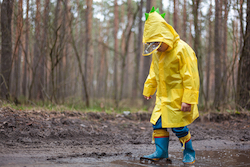Camping in March. It seemed like a good idea at the time.
We got pulled in by the sight of the sun, the lure of the beach, and the promise of warmer days ahead. But those days were not yet, and the rain was unrelenting. We live in a rainforest on the West Coast of British Columbia, so it was hardly surprising that it was likely to be a very soggy time. We decided to go anyway; after all, we are rugged Canadians. Rain jackets and rain boots in tow, we embarked on the first camping trip of the season.
On the plus side, rain meant that the banana slugs made an appearance and the youngest member of our camping party was over the moon. Soon we had another companion in our ranks, a slug called Finley. Young June watched Big Finley as he traversed the edges and navigated the camping chair. She tended to her new friend for hours, bringing him special things to eat. That is, when she wasn’t busy climbing trees or exploring the bugs on a stump. All in the pouring rain. But it didn’t matter; she was in her element and time stood still.
After two relatively sleepless nights with the rain still coming down, the adults decided it was time to call the trip short and head home to our warm, dry beds. The news was not received well by June … not well at all.
There was a mud puddle that had started to pool in the middle of the campsite. (For a slug like Finley, it would have seemed more like a lake.) And it was here, in the mud puddle, that our young camper chose to stage her protest. She threw herself into it, lying on her back like a snow angel with arms and legs flailing widely, mud flying everywhere. I will never forget the sight. With her whole body she declared, she was not leaving. Not leaving the trees, not leaving the stump, not leaving Finley the Slug. “Not fair!!!” screamed a very wet, very muddy, seven-year-old.
I could see that it really didn’t feel fair. The rationale of the adults didn’t hold water for her. She was oblivious to the elements because she was in her element and all that mattered was the world around her that was waiting to be explored. Connections had been made with the Arbutus tree by the water, with the bugs on the stump, and with Finley. No other agenda. No scheduled activities. No homework. Just being.
And so she wailed. And flailed. And insisted that she was staying put, while the puddle got a little smaller and June became more-puddle-than-girl. And while her mother slowly, methodically, took down the tent. It may have been partially out of pure exhaustion, but mom didn’t raise her voice or tell her to stop. She simply said: “I know, you want to stay. But we have to go home now.” And once the tent was away and the car packed up, she gathered her ‘more-mud-than-girl’ daughter in her arms (whose wail had now become more of a whimper), and loaded her in. Finley looked on from a safe distance.
I hazard to guess that most of us have had moments like this, where we wanted to throw ourselves in a puddle and protest, “I don’t want to go!” And of course, we see this in our children. So many of them find themselves out of their element in so many ways. Too much pressure. Too many expectations. A world filled with artificial learning environments and a focus on performance over discovery.
We seem to have lost our way when it comes to what a child truly needs in order to learn and grow. Places and spaces where there is room to explore questions rather than getting the answer right. Where there is room to express what is stirring inside rather than be told what not to do, how not to act. At least a few places … at least some of the time. For this is the only way to get to a place where we are more in tune with the world around us, as well as to the world within us – because this is what makes us more human, more fully alive and more fully ourselves. And I believe it is possible … one slug at a time.
A short note from Gordon: Nature is the main act in the developmental approach, whether it refers to the personification of the developmental process, to our essence as human beings, or to the forests and mountains and seas and creatures that make up our natural environment. Tamara has a beautiful poetic way of bringing them all together, which she will also do in her keynote – Back to Nature Where We Belong – on Day 2 of the upcoming Neufeld Institute Conference 2022 from May 12-14, 2022. You are most welcome to join us for this 3-day online conference, on discovering Nature’s way to bouncing back, or more widely, on all things natural when it comes to parenting, teaching and treatment.

